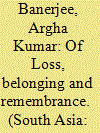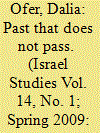|
|
|
Sort Order |
|
|
|
Items / Page
|
|
|
|
|
|
|
| Srl | Item |
| 1 |
ID:
161150


|
|
|
|
|
| Summary/Abstract |
Seventy years after the partitioning of India into two countries, India and Pakistan, the bitter legacies of that violent founding moment have not gone away. While explorations based on oral histories had begun to open up Partition histories, there is still a great deal to be done and the need to record the stories of survivors is urgent as more and more of them are dying out. But even as direct histories become more diffuse and elusive, other explorations have begun to open up as research moves into the hands of non academics, writers, theatre activists and others.
|
|
|
|
|
|
|
|
|
|
|
|
|
|
|
|
| 2 |
ID:
191070


|
|
|
|
|
| Summary/Abstract |
This article undertakes a critical exploration of the Indian poetic responses to World War I. The most striking feature of this poetry was its uniquely diverse nature, which reflected in full the multicultural character of the Indian army at the Western Front and elsewhere in the world. The immense diversity of Indian soldiers triggered a wide range of emotions and ideas from combatants and civilians alike. While we have established writers like Rabindranath Tagore and Sarojini Naidu on the one hand, we have a poetic miscellany of lesser known creative voices on the other, some even documenting their first-hand experiences of the War. Poems, lyrical propaganda, folk-songs, epistolary verse, elegies and even verses accompanying posters make up the various modes of literary circulation during this time of unprecedented global turmoil. Making use of both original compositions and various other works in translation, this article argues that most of this poetic evidence often serves as crucial testimonies, chronicling not only the major historical events of the War years, but also assiduously recording the wide gamut of feelings and emotions associated with the conflict.
|
|
|
|
|
|
|
|
|
|
|
|
|
|
|
|
| 3 |
ID:
086175


|
|
|
|
|
| Publication |
2009.
|
| Summary/Abstract |
The article raises issues that relate to the centrality of the Holocaust in the lives and imagination of many Israelis, and as a pivotal event that shapes their Jewish-Israeli identity. It examines the positions held by Israelis on the meaning of the Holocaust and the shaping of its memory, and asks whether the presence of the Holocaust in our lives represents an honest, unwavering effort to understand the Holocaust and its place in our world as human beings, Jews, and Israelis, or is a result of manipulating forces that use and abuse the memory of the Holocaust to advance unrelated political or social causes. The article presents a profusion of voices in Holocaust discourse and asks whether these are complementary or conflicting messages. It discusses the groups for whom the Holocaust was a personal experience, their offspring, who experienced the Holocaust as a family memory, and others whose memory of the Holocaust was shaped by survivors' testimonies, social processes, and the internalization of cultural messages. It focuses on the contribution of these groups in Holocaust research and artistic representation centering on literature, film, and music.
|
|
|
|
|
|
|
|
|
|
|
|
|
|
|
|
|
|
|
|
|